Thanks to Our Volunteers! – August 2025 Community Wildlife Chapter Updates
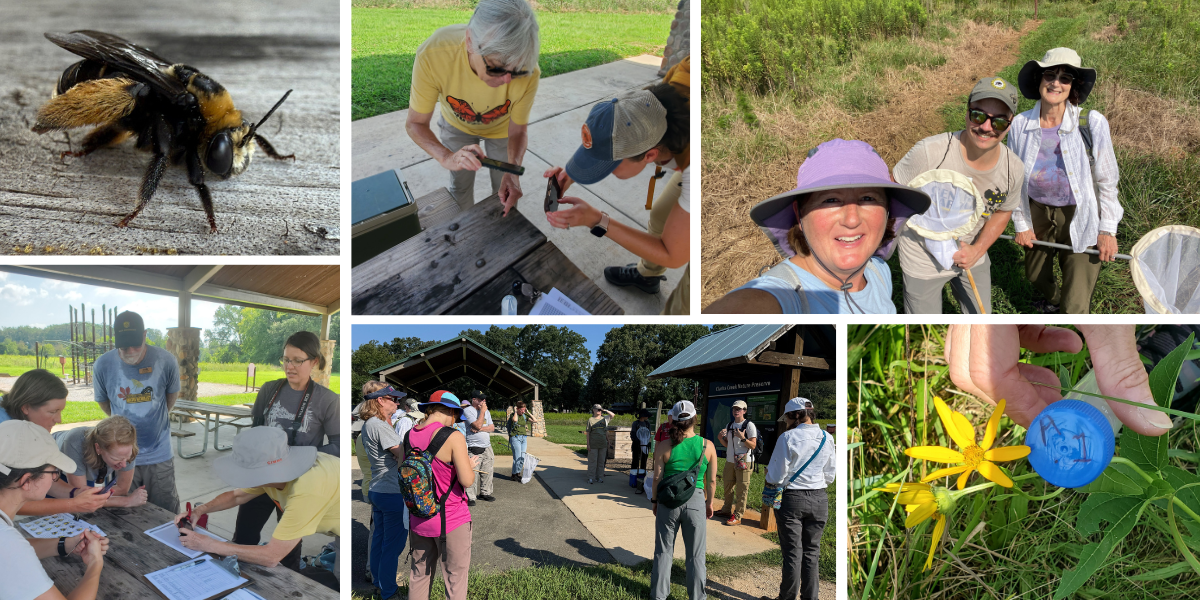
North Carolina Wildlife Federation staff and Community Wildlife Chapter volunteers opened their doors and went outside during the month of August. They connected people to the outdoors through a variety of wildlife and habitat opportunities. River exploring, herp identifying, moth hunting, wildlife wondering, invasive species removing, community building, and much more! In August, 683 people were given the opportunity to connect with nature through one of NCWF’s 32 events! This month from the mountains to the sea, volunteers were able to get outside and restore habitat. Kids and adults across the state were given the opportunity to go outside, connect with nature, and learn about all things wildlife and habitat. Big thanks to our NCWF Community Wildlife Chapters and amazing conservation partners for making this work possible. Stay tuned as we gear up for a busy fall season!
Thanks to partners such as the Duke Energy Foundation, Jandy Ammons Foundation, and Burt’s Bees for helping make these habitat restoration workdays, educational programs and nature outings possible. Explore our Events Calendar to discover where NCWF and our Community Wildlife Chapters are hosting in-person and virtual events near you. Check out a few highlights below from our conservation outreach team.
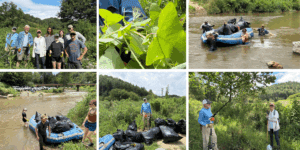
July 19, Todd Island Invasive Species Removal: NCWF High Country Wild alongside New River Conservancy, Blue Ridge Resource Conservation and Development, and Todd Community Preservation Organization held an invasive species removal day along the banks of the South Fork of the New River. Todd Island Park is used by flyfishers, bird watchers, floaters, and families year round. There have been multiple restoration projects at the park to help stabilize the island’s banks and enhance habitat for wildlife. Helene had a major impact on the island and much of the native vegetation that was established was washed away. With many of the native plants being removed from the island, invasive species such as Japanese knotweed and Asian bittersweet are taking over. Invasive species removal efforts are critical to ensure that native plant species thrive and function as the critical foundation for wildlife.
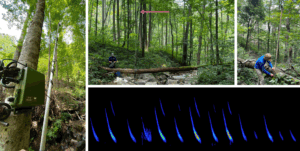
July 30, Pisgah Bat Survey: Pisgah National Forest is home to several federally endangered bat species, including the Gray Bat, Indiana Bat, Northern Long-eared Bat, and Virginia big-eared bat. Conducting surveys in the National Forests and other natural areas to determine bat distribution is an integral component of protecting at-risk bat species and the habitat they call home. North Carolina Wildlife Federation, National Parks Conservation Association, and other partners are working together to survey for at-risk bat species in some of the last remaining patches of old-growth forests and maturing second-growth forests in North Carolina. Our collective goal is to fill area-specific knowledge gaps to provide the best available information for future decision-making in forest management and conservation efforts. To achieve this goal, we are deploying ultrasonic recording units at suitable locations within our study area – the Craggy Mountains – a 16,000 acre portion of Pisgah National Forest. The data will be analyzed using SonoBat – a U.S. Fish and Wildlife Service approved bat call analysis software.
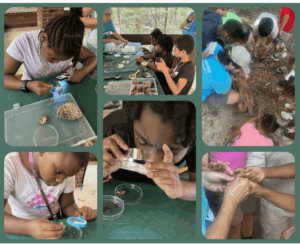
August 1st – Into the wild! Thirty kids from the Salvation Army’s Sedgefield Red Shield Youth Center embraced their inner naturalists today, getting up close with wildlife specimens and trekking through James Boyce Park’s trails, on the lookout for nature’s hidden inhabitants.
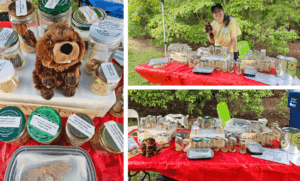
August 2, UCWC Pollinators, Predators & More: NCWF Union County Wildlife chapter leaders showed off their insect skills with an engaging show-and-tell presentation at Dogwood Park in Wesley Chapel. Participants practiced identifying the difference between insect pollinators, insect predators, and insect impersonators. After a crash course in identification, 13 kids and adults went on a wildlife scavenger hunt in the park!
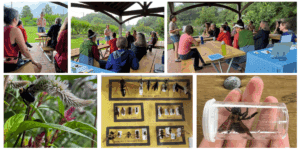
August 2, DWS Pollinator ID Workshop: NCWF Durham Wildlife Stewards Chapter partnered with the Durham Master Gardener Volunteers for a pollinator identification workshop at Briggs Avenue Community Garden in Durham. Led by NC State Ecologist, Dr. Hannah Levenson, on this rainy morning, participants learned how to differentiate between groups of bees, wasps, and flies in preparation for the Great Southeast Pollinator Census (GSPEC). After examining pollinator specimens up close, the group practiced their bee identification skills on some amenable sleepy, wet carpenter and bumble bees that were hanging around the garden.
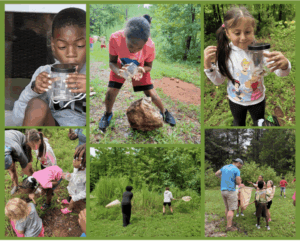
August 4th – What’s the buzz? Ninety kids from the Lexington YMCA joined NCWF’s Great Outdoors University at Stevens Creek Nature Center, learning all about insects and their vital importance in the natural world.
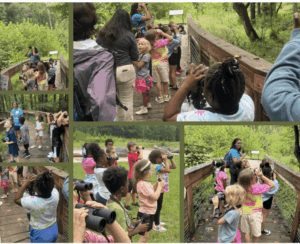
August 8th – Learning about our feathered friends and discovering the joys of birding – that’s what 60 kids from the Davidson Red Shield Youth Center were up to at Stevens Creek Nature Center with NCWF’s Great Outdoors University!
August 13, SSS Birds in Forested Wetlands: John Gerwin, from the NC Museum of Natural Sciences, walked us through the many birds you can encounter in forested wetlands, as well as several of the research projects he has been part of tracking the nesting success of Swainson’s Warbler.

August 15, SWC Wildlife Trivia Night: NCWF South Wake Conservationists chapter held their first ever wildlife trivia night at Black Dog Bottle Shop in Holly Springs. Participants played six rounds of wildlife-themed trivia with categories like: mammals, under the sea, North Carolina, reptiles and amphibians, and animal sounds. The chapter awarded prizes to the winning trivia teams, and everyone learned a thing or two about NC wildlife!
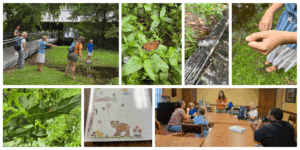
August 16, ecoEXPLORE-ing Entomology: NCWF, Pocosin Lakes NWR, and Tyrrell County library enjoyed this month’s ecoEXPLORE family outing by exploring the educational pollinator garden at the refuge visitor center to search for insects while uploading our observations to iNaturalist.
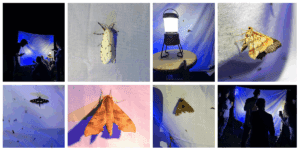
August 16, Moth Night: NCWF Wildlife Habitat Stewards of Northeastern NC Chapter met a moth night on private land and observed over 20 species of moths while also enjoying listening for bats with the assistance of an echometer. Moth observations were submitted to iNaturalist to help contribute to community science!
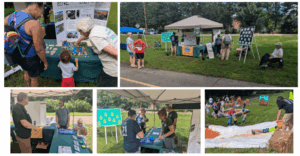
August 16, SWC Mud Day: NCWF South Wake Conservationists chapter tabled at Mud Day at the Walnut Creek Wetland Center in Raleigh. Chapter volunteers engaged community members with interactive activities about frog calls, animal tracks, beavers, frog facts, and North Carolina wildlife trivia. It’s always a good day when you leave muddy!
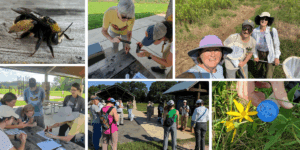
August 17, Bumble Bee Atlas Survey: NCWF Charlotte Wildlife Stewards chapter partnered with the Central Carolinas Master Naturalist Program to participate in the Southeast Bumble Bee Atlas, a community science project led by the Xerces Society to track bumble bee populations across the Southeast. Volunteers collected and captured bumble bees for documentation and data collection. While there weren’t many bumble bees, participants caught and studied other native bees and wasps before releasing them.
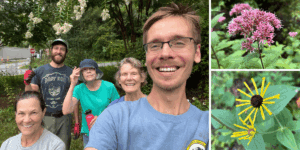
August 19, Lake Tomahawk Garden Workday: NCWF Swannanoa Valley WILD! with support from Black Mountain Recreation hosted a workday at Lake Tomahawk. The volunteer crew removed invasive species as we continued prepping the garden for planting. The chapter has big plans for the garden! Our long-term goal is to transform the space into habitat for wildlife. A garden rich with native plant species, pollinators, mammals, birds, and maybe even a snake or two! And now that we have a pullerbear in the toolbox… anything is possible!!
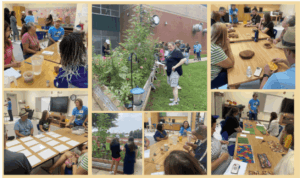
August 19th – CMS Science Lab Teachers are exploring how to spark curiosity and deepen understanding by using the natural world as a living laboratory, thanks to
NCWF’s Great Outdoors University.
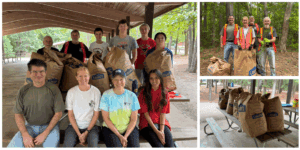
August 19, SWC Invasive Removal at Apex Community Park: NCWF South Wake Conservationists chapter had an invasive removal event at Apex Community Park. SWC partnered with local high school students from South Wake Area Native Ecosystem Conservation (SWANEC) to remove invasive plants. With a focus on pulling Japanese stiltgrass, volunteers were able to let native plants in the park, like dwarf st. John’s wort, breathe a little better.
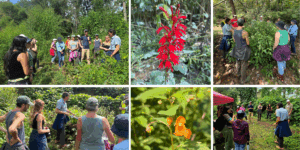
August 20, Native Plants of Fox Creek: With the help of Luke Cannon of Astounding Earth, NCWF Swannanoa Valley WILD! alongside the Friends of Fox Creek Park unlocked the secrets of Fox Creek Park (in spite of some rain showers!). As the chapter wandered through the park, they revealed the hidden wonders of the natural world, from the sweet surprise of jewelweed blossoms to the aromatic spicebush and the resilient black walnut (impossible to crack unless you have a turkey gizzard!). This immersive experience reminded us that Fox Creek is a thriving sanctuary for wildlife, a space to unwind and appreciate, and a haven for human connection. The chapter is committed to nurturing this treasure, fostering a sense of community and inspiring a deeper appreciation for the beauty that surrounds us.
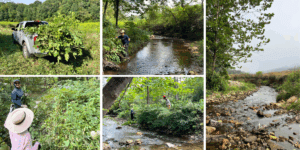
August 21, Bowditch Bottoms Knotweed Removal: NCWF and Southern Appalachian Highlands Conservancy joined forces once again to tackle invasive plant species at Bowditch Bottoms in Yancey County. The crew has already removed the majority of the multiflora rose and autumn olive in one of the wetland areas with the goal of replanting with native wetland species over the course of the next few years. On this workday, we focused on Japanese knotweed growing along the creek on the property. Knotweed is a highly successful invasive plant of wetlands, stream corridors, forest edges, and drainage ditches across the country. Fortunately, we caught it early enough at Bowditch Bottoms and are confident that we’ll be able to manage its spread. Big thanks to all the volunteers who helped with this effort! More work days are being planned, so stay tuned for opportunities to volunteer at Bowditch Bottoms and learn about the project and the partnership!
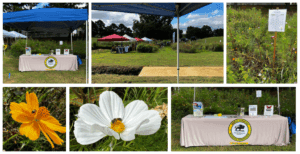
August 22, NCPCA Pollinator Field Day: NCWF participated in Pollinator Field Day at the State Farmer’s Market in Raleigh with North Carolina Pollinator Conservation Alliance. Kids and adults alike stopped by to learn about local pollinators and partner organizations, and most importantly, take part in the census. Participants were serenaded by the chirping of crickets amongst the flowers in the field, as they observed lots of sweat bees and skipper butterflies!
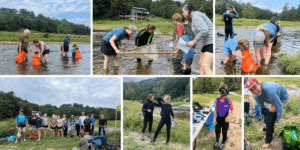
August 23, River Exploration: NCWF High Country Wild and MountainTrue with support from Watauga County, Blue Ridge Conservancy, and Blue Ridge Resource Conservation & Development Council geared up with wetsuits, snorkels, view buckets, field guides, and more as we explored the Watauga River! We caught and released crawfish, snails, and other interesting macroinvertebrates as we discussed biodiversity and the importance of healthy waterways. Kids, students, and adults of all ages enjoyed this special event.
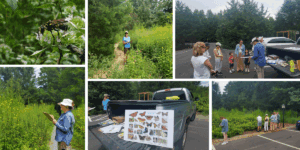
August 23, The Great Southeast Pollinator Census: NCWF Habitat Builders chapter hosted a public event for The Great Southeast Pollinator Census at Marvin Efird Park in Union County, where the chapter manages a Pollinator Pitstop and Certified Wildlife Habitat. Folks of all ages counted pollinators on goldenrod, cutleaf coneflower, mountain mint, and swamp sunflower. Participants were delighted to see monarch butterflies, hummingbird moths, beautiful digger wasps, and tons of Eastern carpenter bees!
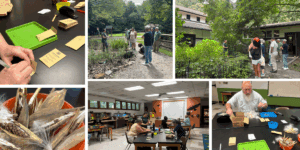
August 23, Native Seed Demo & Garden Tour: NCWF Concord Wildlife Alliance chapter volunteers participated in seed preparation to support the native seed library at Reedy Creek Nature Center. Volunteers cleaned, packaged, and labeled seeds gathered from the wildlife garden at the nature center. Afterwards, folks enjoyed a casual stroll and tour of the gardens led by horticulturist Kendra Dixon.
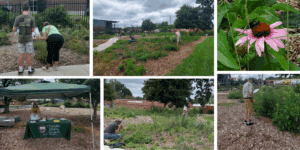
August 22, The Great Southeast Pollinator Census: NCWF Charlotte Wildlife Stewards chapter partnered with the City of Charlotte Landscape Management Division to host a public census event at Tuckaseegee Arboretum & Gardens. Kids, Adults, and even city staff showed up to participate in the county. In total, over 60 counts were submitted and uploaded to the project, contributing important data to help researchers spot trends and better understand pollinator populations.
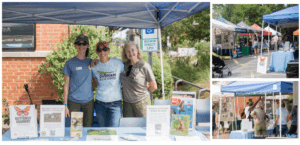
August 23, DWS Great Southeast Pollinator Census: NCWF Durham Wildlife Stewards Chapter participated in the Great Southeast Pollinator Census at the Durham County Extension Office. Local community partners collaborated with the Durham Master Gardeners to provide pollinator games and crafts for kids, encourage people to participate in GSEPC, and chat about local pollinator conservation. Attendees used the demonstration garden to count pollinators, like native bees, butterflies, and flies, for the Census.
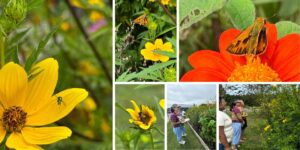
August 23, SSS Great Southeast Pollinator Census: The Swamp Stewards had 8 participants join them to participate in the southeast pollinator census at Julie Strickland Fitness Park and Penn’s Grill in Whiteville.
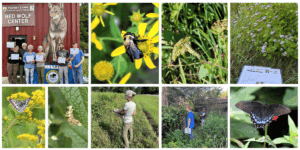
August 23, Great Southeast Pollinator Census & Red Wolf Program: NCWF Wildlife Habitat Stewards of Northeastern NC Chapter partnered with Pocosin Lakes NWR to conduct a count for the Great Southeast Pollinator Census at the Red Wolf Center in Columbia. Following the county, participants enjoyed a Red Wolf program and had the opportunity to view the exhibit wolves that live at the Red Wolf Center.
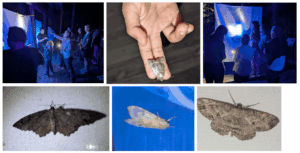
August 23, SWC Moth Night: NCWF South Wake Conservationists chapter held a moth night at Crowder County Park in Apex. Chapter member and environmental educator, Bonnie Eamick, set up UV lights and white sheets to attract a variety of nighttime insects. Naturalists of all ages enjoyed looking for spiders and moths with moth identification help provided by Adam Prince, a Wake County park employee.
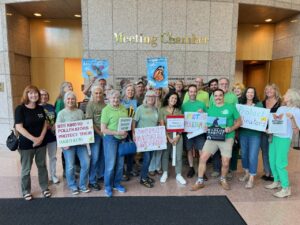
August 25, City Council Public Forum: Alden attended and spoke at the Charlotte City Council Forum in support of amending the City’s overgrown vegetation ordinance to add a height exemption for ‘Naturalistic Landcapes’. Naturalistic landscapes are gardens that support pollinators, birds, and other wildlife. The vegetation is installed to manage and support habitat; therefore, height restrictions do not apply. As a Bee City Affiliate and a Certified Community Wildlife Habitat, Charlotte’s current ordinance undermines the great work the City is doing for pollinators, wildlife, and sustainability. Mayor Vi Lyles has signed the Mayor’s Monarch Pledge each year since 2022, committing the city to action for pollinators. However, conventional landscaping methods encouraged in the current ordinance contribute to climate change, urban air pollution, reduced water quality, stormwater runoff, and the biodiversity crisis our planet faces.
Written by:

– Page Turner, Conservation Coordinator
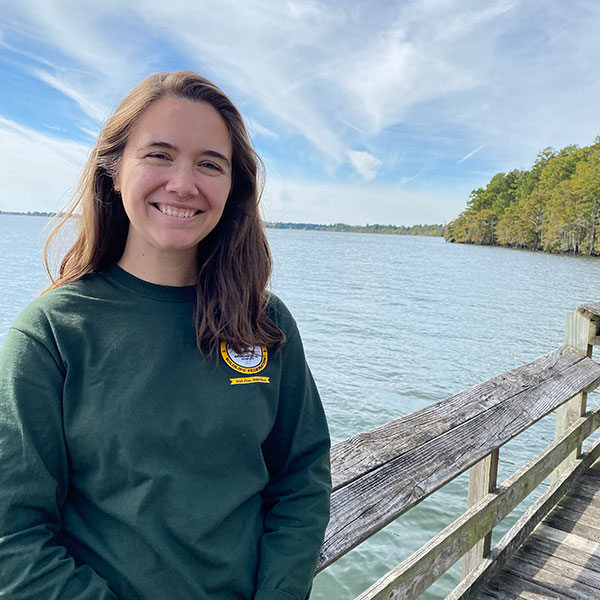
– Laura Frazier, Refuge Conservation Coordinator
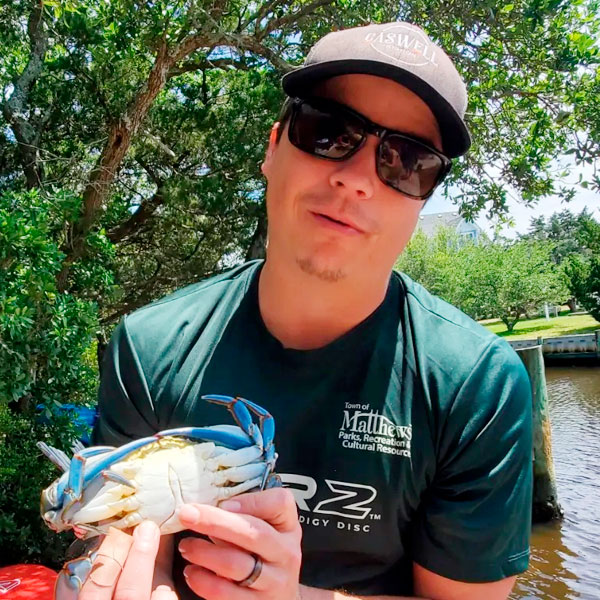
– Alden Picard, Conservation Coordinator
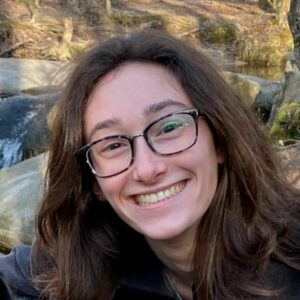
– Kara Solomon, Conservation Coordinator

– Luke Bennett, Conservation Coordinator
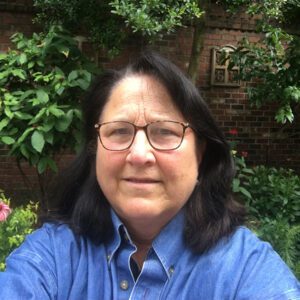
– Mary Bures, VP of Outdoor Engagement

